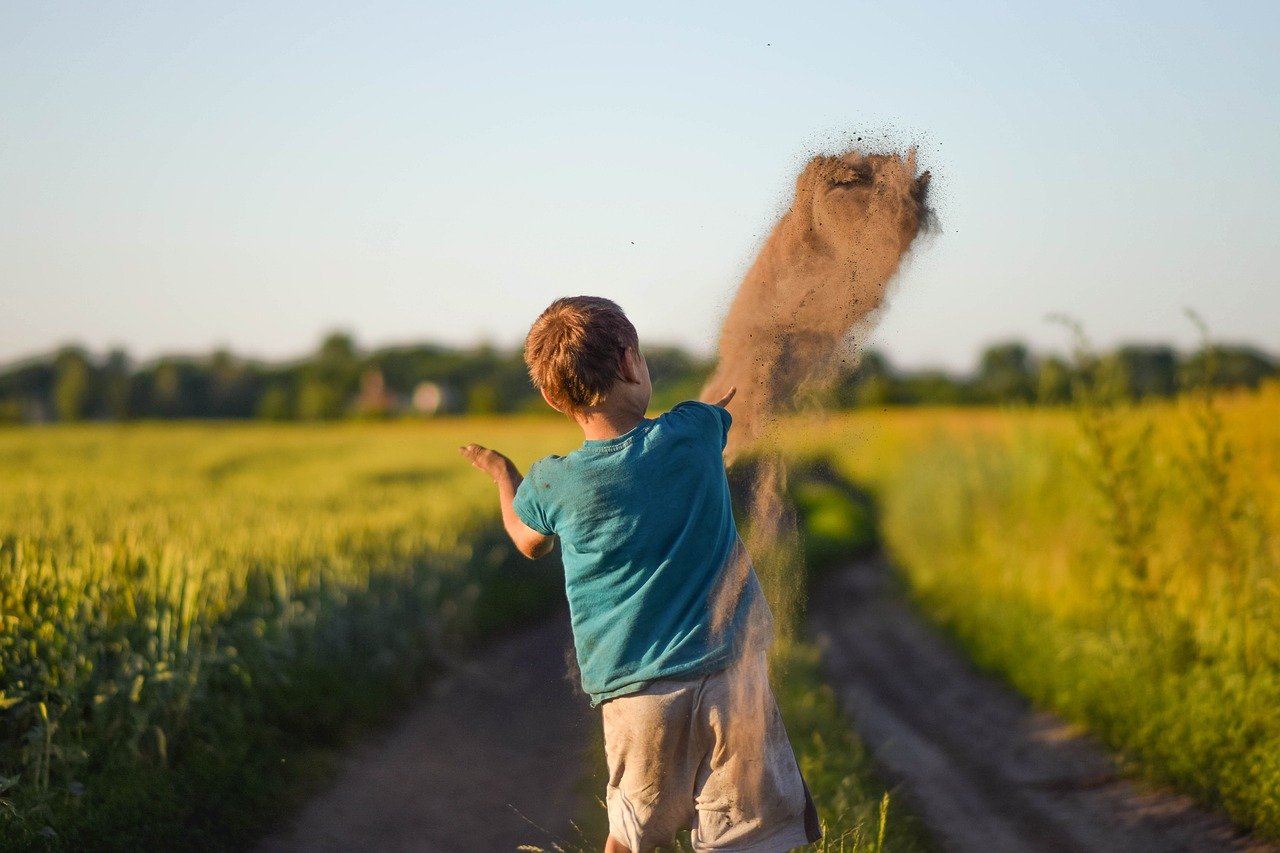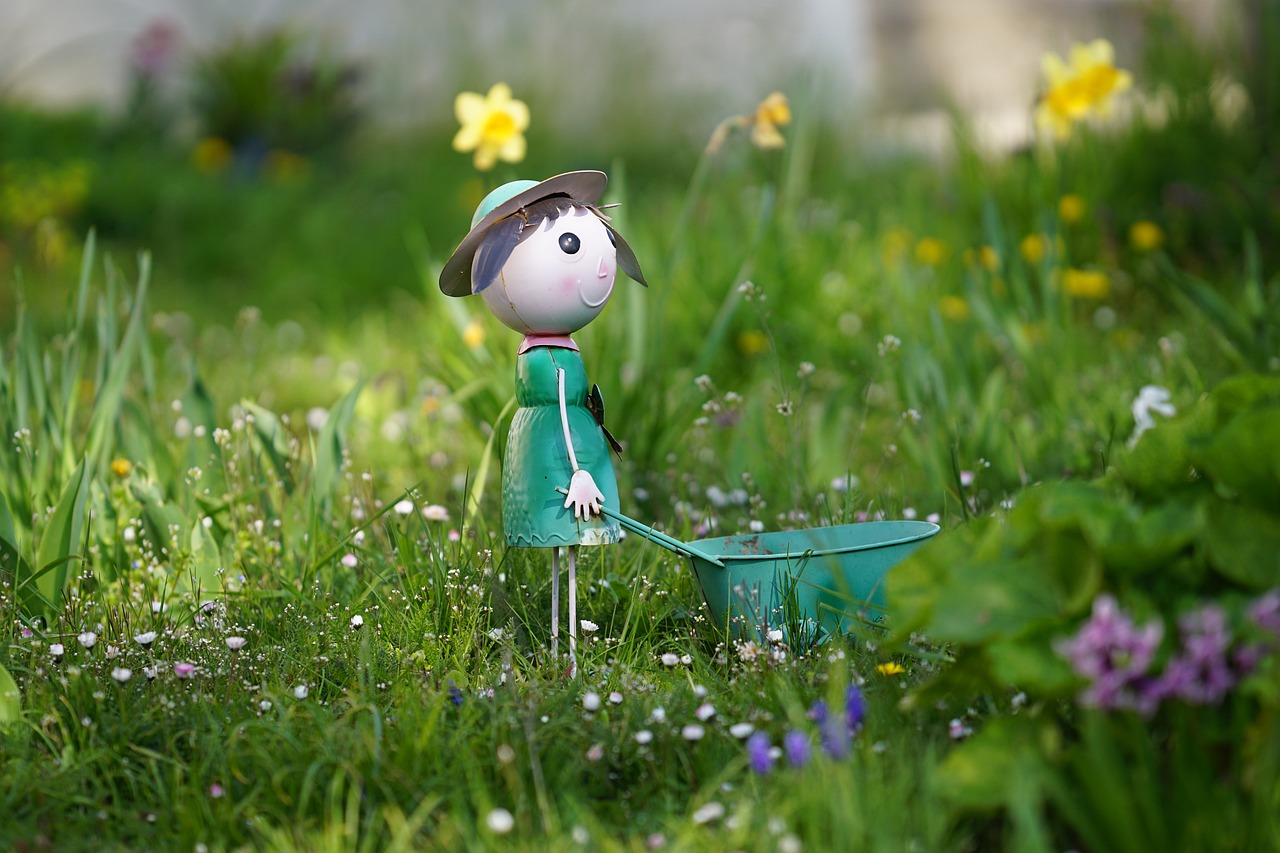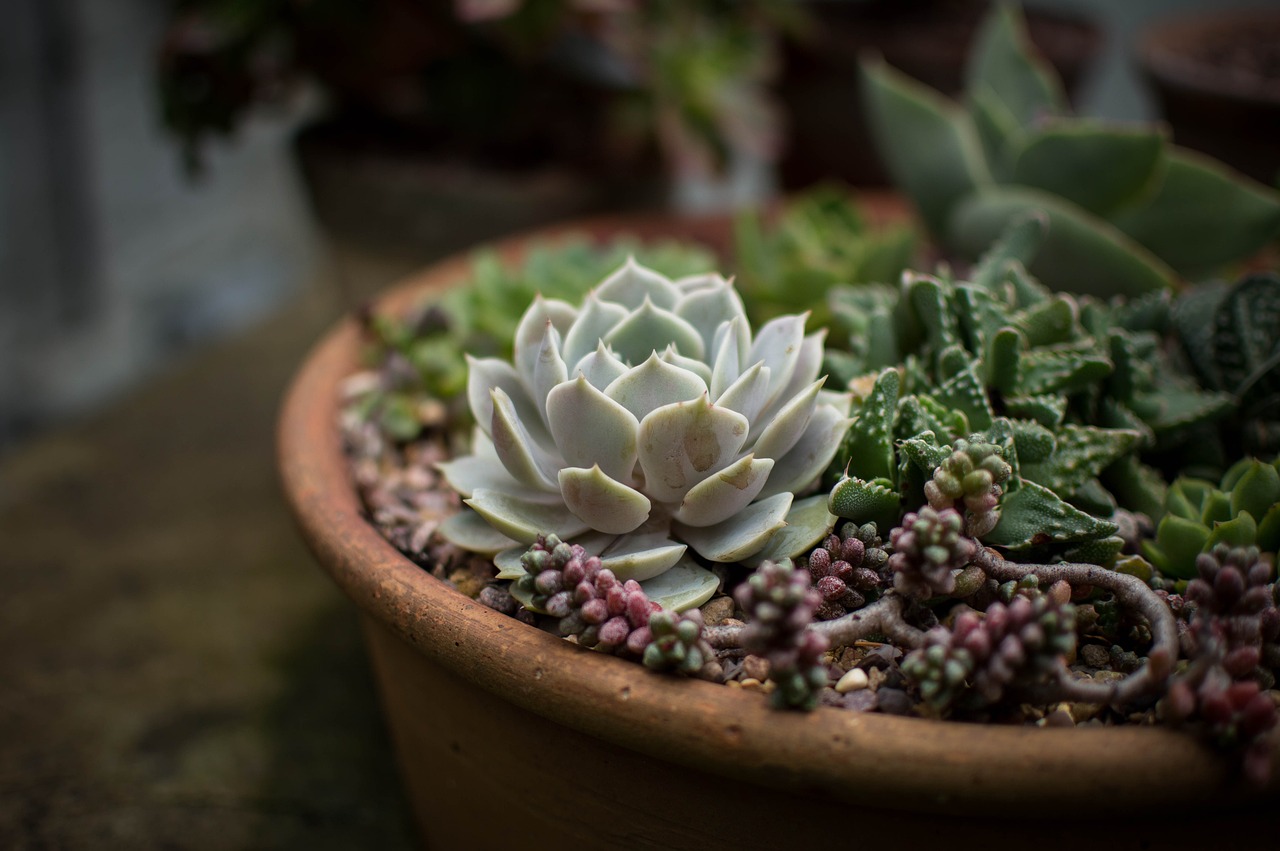Benefits of Eco-Friendly Gardening for Kids
Eco-friendly gardening is not just a trend; it's a powerful tool that can shape the lives of children in remarkable ways. Imagine a world where kids are not only aware of their environment but actively participating in its preservation. By introducing children to eco-friendly gardening, we open the door to a plethora of benefits that extend far beyond the garden's borders. From enhancing environmental awareness to boosting mental well-being, gardening offers a unique blend of education, physical activity, and creativity. Let's dig deeper into these benefits and see how they can cultivate a brighter future for our little ones.
Engaging in eco-friendly gardening helps children understand the importance of sustainability and environmental stewardship, fostering a sense of responsibility towards nature and the planet. When kids get their hands dirty in the soil, they learn firsthand about the delicate balance of ecosystems and the role they play in maintaining it. This hands-on experience creates a lasting impression, making them more likely to adopt environmentally friendly habits as they grow. They start to ask questions like, "Where does my food come from?" or "How can I help the planet?"—questions that spark curiosity and a desire to learn more about the world around them.
Gardening is a fantastic way to encourage kids to be physically active. It's not just about planting flowers or vegetables; it's a full-body workout disguised as play! Kids can engage in various activities such as digging, planting, and weeding, all of which help develop their motor skills and coordination. Picture this: a child joyfully shoveling soil or carefully watering plants, all while getting their daily dose of exercise. This natural form of activity not only keeps them fit but also instills a love for the outdoors.
Hands-on gardening activities enhance children's fine motor skills, as they manipulate small tools and seeds, improving dexterity and hand-eye coordination in a fun environment. When children learn to use tools like trowels, gloves, and watering cans, they are essentially practicing skills that will benefit them in other areas of life. For instance, the precision required in planting seeds helps them practice patience and control, essential traits that will serve them well in school and beyond.
Learning to use various gardening tools helps children gain confidence and independence. Imagine a child proudly wielding a small spade, knowing exactly how to dig a hole for a new plant. This familiarity with tools not only builds their self-esteem but also teaches them responsibility as they learn to care for their equipment. The sense of accomplishment that comes from completing a gardening task can be incredibly empowering.
The act of planting seeds allows children to practice precision and patience. As they learn to handle delicate materials, they understand the importance of care in nurturing growth. It's a beautiful metaphor for life: just as a seed needs the right conditions to flourish, so do our children need love, attention, and guidance to thrive. Watching a seed sprout into a plant is a lesson in patience and the rewards of hard work.
Gardening can be a collaborative activity, teaching children the value of teamwork. When kids work together to plant, maintain, and harvest their garden, they not only learn about cooperation but also build social skills and friendships. Imagine a group of children laughing and chatting as they dig in the dirt together, sharing tools and ideas. These shared experiences foster a sense of community and belonging, essential for their social development.
Spending time in nature through gardening has been shown to reduce stress and anxiety in children. Just think about it: what could be more calming than tending to a garden, surrounded by the beauty of nature? The simple act of being outdoors can promote mental well-being and a sense of tranquility. In a world filled with screens and distractions, gardening offers a refreshing break, allowing kids to reconnect with themselves and their environment.
Gardening encourages mindfulness, as children learn to focus on the present moment and appreciate the beauty of nature. This practice can significantly enhance their ability to manage emotions and stress. When kids are fully engaged in the act of gardening—be it planting seeds or watering plants—they're not worrying about school or social pressures. Instead, they're immersed in the sights, sounds, and smells of the garden, cultivating a sense of peace and contentment.
Through designing their gardens, children can express their creativity. They can explore colors, shapes, and layouts, which fosters imagination and artistic skills. Imagine a child choosing vibrant flowers or arranging vegetables in a way that pleases their eye. This creative freedom not only makes gardening fun but also helps them develop a sense of aesthetic appreciation that can translate into other areas of their lives.
Gardening teaches children about the origins of food and the importance of healthy eating. When kids grow their own fruits and vegetables, they develop a lifelong appreciation for nutritious options. They begin to understand that food doesn't just come from the grocery store; it comes from the earth. This knowledge can lead to healthier eating habits and a greater willingness to try new foods, ultimately benefiting their overall health and well-being.
- What age is appropriate for kids to start gardening? Children as young as three can start gardening with simple tasks like planting seeds and watering plants.
- Do I need a large garden space for eco-friendly gardening? No, even small spaces like balconies or windowsills can be used for container gardening.
- How can I make gardening fun for kids? Incorporate games, themes, and colorful plants to keep them engaged and excited about gardening.

Enhancing Environmental Awareness
This article explores the numerous advantages of introducing children to eco-friendly gardening, highlighting its impact on their development, environmental awareness, and overall well-being.
Engaging in eco-friendly gardening is like opening a treasure chest of knowledge for children. When kids dig their hands into the soil, they are not just playing; they are embarking on a journey that deepens their understanding of sustainability and environmental stewardship. This hands-on experience fosters a sense of responsibility towards nature and the planet, making them feel like true guardians of the Earth.
Imagine a child planting a seed. That simple act transforms into a powerful lesson about life cycles, ecosystems, and the delicate balance of nature. As they water their plants and watch them grow, they learn about the importance of nurturing not just their garden, but also the environment around them. It's an incredible way to instill values that will last a lifetime.
Moreover, eco-friendly gardening introduces kids to the concept of sustainable practices. They learn about composting, reducing waste, and using natural fertilizers, which can lead to a greater understanding of how their choices impact the environment. Here are a few key points on how gardening enhances environmental awareness:
- Connection to Nature: Children develop a deeper appreciation for the natural world.
- Understanding Ecosystems: They learn about plants, insects, and the roles they play in a healthy ecosystem.
- Responsibility: Caring for plants teaches children accountability and the importance of nurturing living things.
Through these experiences, kids not only gain knowledge but also cultivate empathy towards the environment. They start to recognize that their actions have consequences, leading to more mindful behaviors in their daily lives. For instance, they might become more inclined to recycle, conserve water, or participate in local clean-up efforts. This shift in mindset is crucial as it lays the groundwork for a generation that values and protects the planet.
In conclusion, eco-friendly gardening is more than just a fun activity; it is a powerful educational tool that arms children with the awareness they need to become responsible stewards of the environment. By planting seeds in the garden, they are also planting seeds of knowledge and empathy that will grow with them throughout their lives.
Gardening encourages kids to be physically active, providing them with an enjoyable way to exercise while developing motor skills and coordination through planting, digging, and weeding.
Hands-on gardening activities enhance children's fine motor skills, as they manipulate small tools and seeds, improving dexterity and hand-eye coordination in a fun environment.
Learning to use various gardening tools helps children gain confidence and independence, as they become familiar with their functions and develop their ability to complete tasks.
The act of planting seeds allows children to practice precision and patience, as they learn to handle delicate materials and understand the importance of care in nurturing growth.
Gardening can be a collaborative activity, teaching children the value of teamwork as they work together to plant, maintain, and harvest their garden, fostering social skills and friendships.
Spending time in nature through gardening has been shown to reduce stress and anxiety in children, promoting mental well-being and a sense of tranquility.
Gardening encourages mindfulness, as children learn to focus on the present moment and appreciate the beauty of nature, enhancing their ability to manage emotions and stress.
Through designing their gardens, children can express their creativity, allowing them to explore colors, shapes, and layouts, which fosters imagination and artistic skills.
Gardening teaches children about the origins of food and the importance of healthy eating, helping them develop a lifelong appreciation for nutritious fruits and vegetables.
Q: What age is appropriate to start eco-friendly gardening with children?
A: Children can start gardening as early as age 3 with simple tasks like watering plants or planting seeds.
Q: How can I make gardening fun for my kids?
A: Incorporate games, colorful tools, and allow them to choose what to plant to keep them engaged and excited.
Q: What are some eco-friendly practices I can teach my kids?
A: Teach them about composting, using natural pest control, and conserving water through efficient gardening techniques.

Promoting Physical Activity
This article explores the numerous advantages of introducing children to eco-friendly gardening, highlighting its impact on their development, environmental awareness, and overall well-being.
Engaging in eco-friendly gardening helps children understand the importance of sustainability and environmental stewardship, fostering a sense of responsibility towards nature and the planet.
When it comes to keeping our kids active, eco-friendly gardening is a fantastic way to get them moving and grooving! Imagine your little ones digging in the dirt, planting seeds, and watering their plants. Not only is it a fun experience, but it's also a great workout. Gardening encourages kids to be physically active, providing them with an enjoyable way to exercise while developing motor skills and coordination through various activities such as planting, digging, and weeding.
Think about it: instead of sitting in front of a screen, children can immerse themselves in the natural world, getting their hands dirty while learning about the ecosystem. This hands-on approach to gardening promotes a healthy lifestyle, as they engage in activities that strengthen their muscles and improve their overall fitness. Just like playing a sport, gardening requires movement, balance, and coordination, making it an excellent alternative to traditional forms of exercise.
Hands-on gardening activities enhance children's fine motor skills, as they manipulate small tools and seeds, improving their dexterity and hand-eye coordination in a fun environment. For instance, when kids use trowels to dig holes or tweezers to plant tiny seeds, they are not just having fun—they are also honing their ability to control their movements with precision. This is akin to the way a pianist practices scales to develop their finger strength and agility.
Learning to use various gardening tools helps children gain confidence and independence, as they become familiar with their functions and develop their ability to complete tasks. Just picture a child wielding a small spade, feeling like a mighty gardener as they dig into the earth. This sense of accomplishment is empowering and encourages them to take on more challenges, both in the garden and beyond.
The act of planting seeds allows children to practice precision and patience, as they learn to handle delicate materials and understand the importance of care in nurturing growth. It's a beautiful lesson in responsibility—each seed they plant is a promise for the future. As they wait for their plants to sprout, they learn that good things take time, reinforcing the idea that patience is a virtue.
Gardening can be a collaborative activity, teaching children the value of teamwork as they work together to plant, maintain, and harvest their garden, fostering social skills and friendships. Imagine a group of kids strategizing on how to arrange their plants or sharing the joy of harvesting a ripe tomato. These moments not only build camaraderie but also teach them how to communicate and cooperate with others, skills that are invaluable as they grow.
Spending time in nature through gardening has been shown to reduce stress and anxiety in children, promoting mental well-being and a sense of tranquility.
Gardening encourages mindfulness, as children learn to focus on the present moment and appreciate the beauty of nature, enhancing their ability to manage emotions and stress.
Through designing their gardens, children can express their creativity, allowing them to explore colors, shapes, and layouts, which fosters imagination and artistic skills.
Gardening teaches children about the origins of food and the importance of healthy eating, helping them develop a lifelong appreciation for nutritious fruits and vegetables.
- What age is appropriate for kids to start gardening? Kids as young as three can start with simple tasks like planting seeds or watering plants.
- Do I need a lot of space to garden with my kids? Not at all! Container gardening or small raised beds can work wonderfully in limited spaces.
- How can I make gardening fun for my kids? Incorporate games, colorful plants, and even themed gardens to keep their interest alive!

Developing Fine Motor Skills
This article explores the numerous advantages of introducing children to eco-friendly gardening, highlighting its impact on their development, environmental awareness, and overall well-being.
Engaging in eco-friendly gardening helps children understand the importance of sustainability and environmental stewardship, fostering a sense of responsibility towards nature and the planet.
Gardening encourages kids to be physically active, providing them with an enjoyable way to exercise while developing motor skills and coordination through planting, digging, and weeding.
Hands-on gardening activities enhance children's fine motor skills, as they manipulate small tools and seeds, improving dexterity and hand-eye coordination in a fun environment. Imagine a child carefully using a trowel to dig a small hole for a seed; this simple act is not just about planting—it's a delightful dance of precision and control. The more they practice, the more adept they become, almost like musicians mastering their instruments.
In the garden, children learn to use a variety of gardening tools, each designed for a specific purpose. For instance, using a hand trowel or a small spade requires a different grip and technique, which challenges them to adapt and refine their movements. As they learn to wield these tools, they gain confidence and a sense of independence, realizing that they can achieve tasks on their own. This newfound ability to handle tools effectively translates into other areas of their lives, as they become more capable and self-reliant.
Moreover, the act of planting seeds is a fantastic way for children to practice precision and patience. They must learn to handle delicate materials, ensuring that each seed is placed at the right depth and distance apart. This process teaches them not only about the physical act of planting but also the importance of care and nurturing in achieving growth. Just like a painter needs to be careful with their brush strokes, children learn that gardening requires similar attention to detail.
Gardening also provides ample opportunities for children to engage in creative problem-solving. For example, if a seed doesn’t sprout, they must think critically about what went wrong—was it too dry, too wet, or did it need more sunlight? This inquiry fosters a sense of curiosity and encourages them to experiment, leading to a deeper understanding of the natural world.
Learning to use various gardening tools helps children gain confidence and independence, as they become familiar with their functions and develop their ability to complete tasks. Each tool becomes a new companion in their gardening adventure, inviting them to explore and discover.
The act of planting seeds allows children to practice precision and patience, as they learn to handle delicate materials and understand the importance of care in nurturing growth. Just as a sculptor molds clay, children shape their gardens, learning that great things take time and effort.
Gardening can be a collaborative activity, teaching children the value of teamwork as they work together to plant, maintain, and harvest their garden, fostering social skills and friendships.
Spending time in nature through gardening has been shown to reduce stress and anxiety in children, promoting mental well-being and a sense of tranquility.
Gardening encourages mindfulness, as children learn to focus on the present moment and appreciate the beauty of nature, enhancing their ability to manage emotions and stress.
Through designing their gardens, children can express their creativity, allowing them to explore colors, shapes, and layouts, which fosters imagination and artistic skills.
Gardening teaches children about the origins of food and the importance of healthy eating, helping them develop a lifelong appreciation for nutritious fruits and vegetables.
- What age is appropriate for kids to start gardening?
Children as young as three can begin gardening with simple tasks, while older kids can handle more complex activities.
- Is eco-friendly gardening expensive?
Not at all! Eco-friendly gardening can be done on a budget using recycled materials and seeds from fruits and vegetables.
- What are some easy plants for kids to grow?
Some great options include sunflowers, radishes, and beans, which are easy to grow and quick to see results.

Using Gardening Tools
This article explores the numerous advantages of introducing children to eco-friendly gardening, highlighting its impact on their development, environmental awareness, and overall well-being.
Engaging in eco-friendly gardening helps children understand the importance of sustainability and environmental stewardship, fostering a sense of responsibility towards nature and the planet.
Gardening encourages kids to be physically active, providing them with an enjoyable way to exercise while developing motor skills and coordination through planting, digging, and weeding.
Hands-on gardening activities enhance children's fine motor skills, as they manipulate small tools and seeds, improving dexterity and hand-eye coordination in a fun environment.
One of the most exciting aspects of gardening for kids is learning to use gardening tools. These tools are not just instruments; they are gateways to a world of discovery. When children handle tools like trowels, shovels, and watering cans, they gain a sense of empowerment and independence. Imagine a young gardener, proudly wielding a small spade, digging into the earth with determination! This hands-on experience not only teaches them about the tools themselves but also instills a sense of responsibility.
As children become familiar with various gardening tools, they learn to appreciate their specific functions. For instance, a trowel is perfect for digging small holes, while a rake helps tidy up the soil. By understanding the purpose of each tool, kids can approach gardening tasks with confidence. This knowledge translates into a feeling of accomplishment when they successfully complete a gardening project, whether it’s planting a new flower bed or harvesting vegetables.
Moreover, using gardening tools promotes coordination and strength. As they lift, push, and pull, children are not just working the soil; they are also building muscle and improving their overall physical health. It’s like a mini workout, disguised as play! And let’s not forget about safety — learning how to handle tools properly teaches children to respect their environment and be cautious, which are vital skills both in the garden and beyond.
In the process, children also learn about teamwork. When gardening with friends or family, they can share tools, help each other, and collaborate on tasks. This shared experience creates bonds and teaches them the value of working together. It’s a beautiful synergy of learning, creativity, and friendship that blossoms right alongside the plants they nurture.
Spending time in nature through gardening has been shown to reduce stress and anxiety in children, promoting mental well-being and a sense of tranquility.
Gardening encourages mindfulness, as children learn to focus on the present moment and appreciate the beauty of nature, enhancing their ability to manage emotions and stress.
Through designing their gardens, children can express their creativity, allowing them to explore colors, shapes, and layouts, which fosters imagination and artistic skills.
Gardening teaches children about the origins of food and the importance of healthy eating, helping them develop a lifelong appreciation for nutritious fruits and vegetables.
- Why is eco-friendly gardening important for children? Eco-friendly gardening teaches children about sustainability, responsibility, and the importance of caring for the environment.
- What age is suitable for kids to start gardening? Children as young as three can begin gardening with simple tasks, while older kids can take on more complex projects.
- How can gardening improve a child's health? Gardening promotes physical activity, encourages healthy eating habits, and can reduce stress and anxiety.
- What tools are best for kids to use in the garden? Look for lightweight, child-sized tools like trowels, rakes, and watering cans to ensure safety and ease of use.

Planting Seeds
This article explores the numerous advantages of introducing children to eco-friendly gardening, highlighting its impact on their development, environmental awareness, and overall well-being.
Engaging in eco-friendly gardening helps children understand the importance of sustainability and environmental stewardship, fostering a sense of responsibility towards nature and the planet.
Gardening encourages kids to be physically active, providing them with an enjoyable way to exercise while developing motor skills and coordination through planting, digging, and weeding.
Hands-on gardening activities enhance children's fine motor skills, as they manipulate small tools and seeds, improving dexterity and hand-eye coordination in a fun environment.
Learning to use various gardening tools helps children gain confidence and independence, as they become familiar with their functions and develop their ability to complete tasks.
Planting seeds is not just a simple task; it's a magical experience that allows children to witness the miracle of life unfolding right before their eyes. When kids engage in this activity, they learn valuable lessons about patience and care. Each seed they plant carries the potential to grow into something beautiful, whether it be a vibrant flower or a delicious vegetable. This process not only captivates their imagination but also instills a sense of responsibility as they nurture their plants from tiny seeds to flourishing organisms.
Moreover, planting seeds offers a fantastic opportunity for children to practice precision. As they place each seed in the soil, they learn to gauge the right depth and spacing, which is crucial for healthy growth. This hands-on activity can be a fun way to introduce basic concepts of biology and botany. For instance, children can observe how different seeds require different conditions to thrive, leading to discussions about light, water, and soil quality.
Additionally, the act of planting seeds can be enhanced with creativity. Kids can design their little garden plots, choosing which seeds to plant and where to place them. This not only makes the task more enjoyable but also allows them to express their artistic flair. Imagine a garden where a sunflower stands tall next to a patch of colorful marigolds – it’s a canvas of nature they have created!
As they nurture their seeds, children can track their growth, perhaps even keeping a journal of their gardening adventure. This can include:
- Sketching the plants at different growth stages
- Writing down observations about their care routines
- Documenting any challenges they face, such as pests or weather changes
In essence, planting seeds is a gateway to numerous learning experiences. It combines science, art, and life skills, all wrapped up in the joy of gardening. So, the next time your child is out in the garden, remember that they are not just planting seeds; they are planting the seeds of knowledge, creativity, and responsibility!
Gardening can be a collaborative activity, teaching children the value of teamwork as they work together to plant, maintain, and harvest their garden, fostering social skills and friendships.
Spending time in nature through gardening has been shown to reduce stress and anxiety in children, promoting mental well-being and a sense of tranquility.
Gardening encourages mindfulness, as children learn to focus on the present moment and appreciate the beauty of nature, enhancing their ability to manage emotions and stress.
Through designing their gardens, children can express their creativity, allowing them to explore colors, shapes, and layouts, which fosters imagination and artistic skills.
Gardening teaches children about the origins of food and the importance of healthy eating, helping them develop a lifelong appreciation for nutritious fruits and vegetables.
- What age is appropriate for kids to start gardening? Most children can start gardening as early as 3 years old, with simple tasks like planting seeds and watering plants.
- How can I make gardening fun for my kids? Incorporate games, colorful tools, and allow them to choose what to plant to keep their interest alive.
- What are some easy plants for kids to grow? Sunflowers, beans, and herbs like basil are great choices due to their fast growth and ease of care.
- How does gardening help with mental health? Gardening has been shown to reduce stress and anxiety, providing a calming effect through connection with nature.

Encouraging Teamwork
This article explores the numerous advantages of introducing children to eco-friendly gardening, highlighting its impact on their development, environmental awareness, and overall well-being.
Engaging in eco-friendly gardening helps children understand the importance of sustainability and environmental stewardship, fostering a sense of responsibility towards nature and the planet.
Gardening encourages kids to be physically active, providing them with an enjoyable way to exercise while developing motor skills and coordination through planting, digging, and weeding.
Hands-on gardening activities enhance children's fine motor skills, as they manipulate small tools and seeds, improving dexterity and hand-eye coordination in a fun environment.
Learning to use various gardening tools helps children gain confidence and independence, as they become familiar with their functions and develop their ability to complete tasks.
The act of planting seeds allows children to practice precision and patience, as they learn to handle delicate materials and understand the importance of care in nurturing growth.
Gardening can be a collaborative activity, teaching children the value of teamwork as they work together to plant, maintain, and harvest their garden. Imagine a group of kids, each with their own little plot, learning to share tools, ideas, and responsibilities. This not only fosters social skills but also builds friendships that can last a lifetime. When they plant seeds side by side, they learn to communicate effectively, negotiate tasks, and celebrate each other's successes. Teamwork in gardening is like a symphony; every child plays a unique instrument, contributing to a harmonious outcome.
Additionally, when children face challenges in the garden, such as dealing with pests or unexpected weather, they learn to problem-solve together. This collaborative effort not only strengthens their bonds but also instills a sense of accomplishment as they overcome obstacles as a team. By sharing responsibilities, they understand that every role is important—whether it's watering plants, pulling weeds, or simply providing encouragement. In essence, eco-friendly gardening teaches kids that together, they can achieve much more than they could alone.
Spending time in nature through gardening has been shown to reduce stress and anxiety in children, promoting mental well-being and a sense of tranquility.
Gardening encourages mindfulness, as children learn to focus on the present moment and appreciate the beauty of nature, enhancing their ability to manage emotions and stress.
Through designing their gardens, children can express their creativity, allowing them to explore colors, shapes, and layouts, which fosters imagination and artistic skills.
Gardening teaches children about the origins of food and the importance of healthy eating, helping them develop a lifelong appreciation for nutritious fruits and vegetables.
- What age is appropriate for kids to start gardening?
Children as young as three can start gardening with simple tasks like planting seeds or watering plants. - What are some easy plants for kids to grow?
Consider starting with fast-growing plants like radishes, sunflowers, or herbs like basil and mint. - How can gardening benefit my child's education?
Gardening integrates science, math, and art, making learning fun and engaging while teaching responsibility and patience. - Is eco-friendly gardening expensive?
No, eco-friendly gardening can be done on a budget using recycled materials and seeds from fruits and vegetables.

Boosting Mental Well-being
Engaging in eco-friendly gardening offers children an incredible way to boost their mental well-being. Imagine a world where kids can escape the hustle and bustle of daily life, where they can dig their hands into the soil and connect with nature. This simple act can work wonders for their mental health. Research shows that spending time outdoors, especially in green spaces, significantly reduces stress and anxiety levels. It’s like a natural remedy, providing a sense of calm and tranquility that is hard to find in our fast-paced lives.
When children immerse themselves in gardening, they are not just planting seeds; they are also planting seeds of mindfulness. This means they learn to focus on the present moment, appreciating the sights, sounds, and smells of their surroundings. It’s a beautiful way to practice mindfulness, helping them to manage their emotions more effectively. Just picture them feeling the warm sun on their faces, listening to the gentle rustle of leaves, and observing the tiny creatures that inhabit their gardens. These experiences can enhance their emotional regulation and resilience.
Moreover, gardening is a fantastic outlet for creative expression. Children can design their gardens in any way they like, choosing colors, shapes, and layouts that reflect their personalities. This freedom to create not only fosters their imagination but also boosts their self-esteem. When they see their ideas come to life, it instills a sense of accomplishment. It’s like being an artist, but instead of a canvas, they have a patch of earth where their creativity can flourish.
Additionally, gardening can serve as a therapeutic activity. Many children find joy and solace in nurturing plants, watching them grow, and understanding the cycle of life. It’s a lesson in patience and responsibility, as they learn that growth takes time and care. This nurturing aspect can lead to a profound sense of connection to the world around them, reinforcing the idea that they can make a difference, no matter how small. As they water their plants and watch them thrive, they experience the satisfaction of contributing to life, which can be incredibly uplifting.
To illustrate the mental health benefits of gardening further, consider the following table that summarizes key advantages:
| Benefits | Description |
|---|---|
| Stress Reduction | Gardening helps lower cortisol levels, reducing stress and anxiety. |
| Mindfulness | Encourages children to focus on the present and appreciate nature. |
| Creative Expression | Allows kids to explore their creativity through garden design. |
| Sense of Accomplishment | Watching plants grow boosts self-esteem and provides a sense of achievement. |
In conclusion, eco-friendly gardening is much more than just a fun activity; it’s a powerful tool for enhancing children's mental well-being. By connecting with nature, they learn valuable life skills, nurture their creativity, and find peace in the process. So, why not encourage the little ones in your life to grab a trowel and start digging? They might just uncover a treasure trove of mental health benefits along the way!
- What age is appropriate for children to start gardening? Most children can start gardening as early as 3 years old with simple tasks like planting seeds or watering plants.
- Do I need a large garden for my child to benefit from gardening? No, even a small balcony or a few pots can provide a great gardening experience for kids.
- What types of plants are best for children to grow? Easy-to-grow plants like sunflowers, radishes, and herbs are great choices for kids.
- How can I make gardening more fun for my child? Incorporate games, colorful tools, and allow them to design their own garden space to enhance enjoyment.

Mindfulness in Nature
This article explores the numerous advantages of introducing children to eco-friendly gardening, highlighting its impact on their development, environmental awareness, and overall well-being.
Engaging in eco-friendly gardening helps children understand the importance of sustainability and environmental stewardship, fostering a sense of responsibility towards nature and the planet.
Gardening encourages kids to be physically active, providing them with an enjoyable way to exercise while developing motor skills and coordination through planting, digging, and weeding.
Hands-on gardening activities enhance children's fine motor skills, as they manipulate small tools and seeds, improving dexterity and hand-eye coordination in a fun environment.
Learning to use various gardening tools helps children gain confidence and independence, as they become familiar with their functions and develop their ability to complete tasks.
The act of planting seeds allows children to practice precision and patience, as they learn to handle delicate materials and understand the importance of care in nurturing growth.
Gardening can be a collaborative activity, teaching children the value of teamwork as they work together to plant, maintain, and harvest their garden, fostering social skills and friendships.
Spending time in nature through gardening has been shown to reduce stress and anxiety in children, promoting mental well-being and a sense of tranquility.
Gardening encourages mindfulness, as children learn to focus on the present moment and appreciate the beauty of nature. Imagine a child kneeling in the soil, feeling the cool earth between their fingers, and noticing the vibrant colors of blooming flowers. This connection to nature allows them to step away from the hustle and bustle of daily life and immerse themselves in a peaceful environment.
When kids engage in gardening, they practice being aware of their surroundings, which can significantly enhance their emotional regulation. Here are a few ways gardening promotes mindfulness:
- Observation: Children learn to observe the growth of plants, noticing changes and cycles, which teaches them patience and the importance of nurturing.
- Breathing: The act of being outdoors and tending to plants encourages deep, mindful breathing, helping to reduce anxiety.
- Connection: Gardening fosters a connection to the earth, promoting a sense of belonging and purpose.
By engaging in these mindful practices, children can develop a greater appreciation for nature, which can lead to improved mental clarity and emotional health. As they learn to appreciate the simple joys of gardening, they cultivate a sense of gratitude that extends beyond the garden, positively influencing their everyday lives.
Gardening teaches children about the origins of food and the importance of healthy eating, helping them develop a lifelong appreciation for nutritious fruits and vegetables.
Kids as young as three can start gardening with simple tasks like planting seeds and watering plants. As they grow older, they can take on more complex responsibilities.
Some easy plants to grow include sunflowers, radishes, and herbs like basil and mint. These plants are quick to grow and can keep children engaged.
Gardening can enhance learning in subjects like science, math, and art. It provides hands-on experiences that make abstract concepts more tangible and enjoyable.
Not at all! Eco-friendly gardening can be done on a budget. Using recycled materials for planters and composting kitchen scraps can save money while being sustainable.
Yes! Gardening often involves teamwork, which helps children develop social skills, learn to communicate, and build friendships as they work together towards a common goal.

Creative Expression
Gardening is not just about planting seeds and watering them; it’s a vibrant canvas for children to express their creativity! Imagine a child stepping into a garden, where each plant is like a brushstroke on a masterpiece. They can choose the colors of flowers, the shapes of leaves, and even the layout of the garden itself. This freedom to design their own green space allows kids to explore their imagination and bring their unique vision to life.
When children engage in garden design, they learn to make choices that reflect their personal style. For instance, they might decide to create a butterfly garden filled with colorful blooms that attract these delicate creatures or a vegetable patch where they can grow their own snacks. Each decision they make adds to their sense of ownership and pride in the garden. Not only does this process foster creativity, but it also teaches them about planning and organization, as they must consider aspects like sunlight, space, and plant compatibility.
Moreover, gardening can serve as a fantastic outlet for artistic expression. Children can use various materials to decorate their gardens, such as:
- Painted rocks as markers for plants
- Homemade bird feeders to attract wildlife
- Colorful garden stakes to label their plants
These creative projects not only beautify the garden but also engage children in hands-on activities that enhance their fine motor skills. As they paint, glue, and build, they are also developing their artistic abilities. The garden becomes a living gallery where their creativity can flourish, and they can take pride in sharing their creations with family and friends.
Additionally, gardening allows for the exploration of different sensory experiences. Children can touch the rough bark of trees, smell the fragrant herbs, and observe the intricate patterns of leaves. This sensory engagement can spark new ideas and inspire them to create unique garden themes. For example, a child might decide to create a sensory garden featuring plants with different textures, scents, and colors. This not only promotes creativity but also deepens their connection to nature.
Ultimately, through gardening, children learn that creativity is not just about the final product but also about the process. They discover the joy of experimentation—trying out new plant combinations, rearranging flowers, or even starting a compost bin. Each attempt, whether successful or not, is a valuable lesson in resilience and innovation. This hands-on approach to creativity not only nurtures their artistic side but also encourages them to think critically and solve problems, skills that will benefit them throughout their lives.
- What are the best plants for kids to grow?
Some great options include sunflowers, radishes, and beans. These plants grow quickly and are easy to care for, making them perfect for young gardeners.
- How can I make gardening more fun for my kids?
Incorporate games, like scavenger hunts for different types of leaves or flowers, and let them choose what to plant. You can also have themed gardening days, such as "Rainbow Day" where they plant flowers of different colors.
- Is gardening a good way to teach kids about responsibility?
Absolutely! Caring for plants teaches children about commitment and the importance of nurturing living things, which can translate into other areas of their lives.

Understanding Nutrition
Gardening is not just a fun outdoor activity; it serves as an incredible gateway for children to learn about nutrition and the vital role it plays in their lives. When kids get their hands dirty in the soil, they’re not only planting seeds but also planting the seeds of knowledge about where their food comes from. This hands-on experience can be transformative. Imagine them watching a tiny seed sprout into a vibrant plant, realizing that their efforts directly contribute to their meals. It’s like magic, but it’s grounded in nature and science!
Through eco-friendly gardening, children gain a deeper understanding of the origins of food. They learn that fruits and vegetables don’t just appear in shiny packages at the grocery store; they come from the earth, nurtured by sunlight, water, and care. This understanding is crucial in an age where processed foods dominate our diets. By growing their own produce, kids can develop a lifelong appreciation for nutritious options. They begin to recognize the difference between fresh, homegrown vegetables and store-bought ones, often preferring the taste of what they've nurtured themselves.
Furthermore, gardening can introduce children to a variety of nutritional concepts. For instance, as they explore different plants, they can learn about:
- Vitamins and Minerals: Discussing the health benefits of various vegetables and fruits helps them understand what their bodies need to grow strong.
- Seasonal Eating: Kids can learn about which crops grow in different seasons, promoting the idea of eating what’s in season for better taste and nutrition.
- Organic Practices: Teaching them about organic gardening methods can instill values about reducing chemicals in their food and the importance of sustainability.
This knowledge not only fosters a connection to the food they eat but also encourages them to make healthier choices. Picture a child who has grown their own tomatoes; they’re more likely to reach for those juicy fruits instead of a sugary snack! It’s about creating a positive relationship with food that can last a lifetime.
Moreover, gardening can also spark curiosity about different cuisines and cultures, as children discover how various foods are used around the world. This exploration can lead to exciting family discussions about recipes, ingredients, and the importance of a balanced diet. When children are involved in the process of growing their meals, they are more likely to ask questions and engage in conversations about the food they consume.
In conclusion, eco-friendly gardening is a delightful way for children to learn about nutrition. It’s not merely about planting seeds; it’s about sowing the knowledge of healthy eating habits, environmental responsibility, and the joys of nurturing life. As they dig, plant, and harvest, they are cultivating a deeper understanding of what it means to eat well and live healthily.
Q: How does gardening improve children's understanding of nutrition?
A: Gardening allows children to see firsthand where their food comes from, helping them appreciate fresh produce and encouraging healthier eating habits.
Q: What are some easy vegetables for kids to grow?
A: Some great options include radishes, lettuce, and tomatoes, which are relatively easy to care for and grow quickly, keeping kids engaged.
Q: Can gardening activities be integrated into school curriculums?
A: Absolutely! Many schools are incorporating gardening into their curriculums to teach students about science, nutrition, and responsibility.
Frequently Asked Questions
- What are the benefits of eco-friendly gardening for kids?
Eco-friendly gardening offers numerous benefits for children, including enhancing their environmental awareness, promoting physical activity, and boosting mental well-being. By engaging in gardening, kids learn about sustainability and develop a sense of responsibility towards the environment.
- How does gardening help children develop fine motor skills?
Gardening activities, such as planting seeds and using small tools, help improve children's fine motor skills. These hands-on tasks require dexterity and coordination, allowing kids to practice and enhance their hand-eye coordination in a fun and interactive way.
- Can gardening promote teamwork among children?
Absolutely! Gardening can be a collaborative experience where children work together to plant, maintain, and harvest their garden. This teamwork fosters social skills, strengthens friendships, and teaches kids the value of cooperation.
- How does spending time in the garden affect children's mental health?
Spending time gardening has been shown to reduce stress and anxiety in children. The calming nature of being outdoors promotes mental well-being and helps kids find tranquility, allowing them to manage their emotions better.
- What skills can children develop through creative gardening?
Gardening provides a fantastic outlet for creative expression. Children can design their gardens, exploring colors, shapes, and layouts. This fosters their imagination and artistic skills, allowing them to express themselves in a unique way.
- How does gardening teach kids about nutrition?
Through gardening, children learn about where their food comes from and the importance of healthy eating. Growing their own fruits and vegetables helps them appreciate nutritious foods, encouraging lifelong healthy eating habits.



















